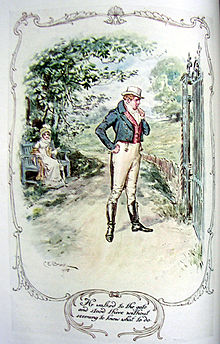
Jane Austen was an English novelist known primarily for her six novels, which implicitly interpret, critique, and comment upon the British landed gentry at the end of the 18th century. Austen's plots often explore the dependence of women on marriage for the pursuit of favourable social standing and economic security. Her works are an implicit critique of the novels of sensibility of the second half of the 18th century and are part of the transition to 19th-century literary realism. Her deft use of social commentary, realism and biting irony have earned her acclaim among critics and scholars.

Sense and Sensibility is the first novel by the English author Jane Austen, published in 1811. It was published anonymously; By A Lady appears on the title page where the author's name might have been. It tells the story of the Dashwood sisters, Elinor and Marianne as they come of age. They have an older half-brother, John, and a younger sister, Margaret.

Emma is a novel written by English author Jane Austen. It is set in the fictional country village of Highbury and the surrounding estates of Hartfield, Randalls and Donwell Abbey, and involves the relationships among people from a small number of families. The novel was first published in December 1815, although the title page is dated 1816. As in her other novels, Austen explores the concerns and difficulties of genteel women living in Georgian–Regency England. Emma is a comedy of manners.
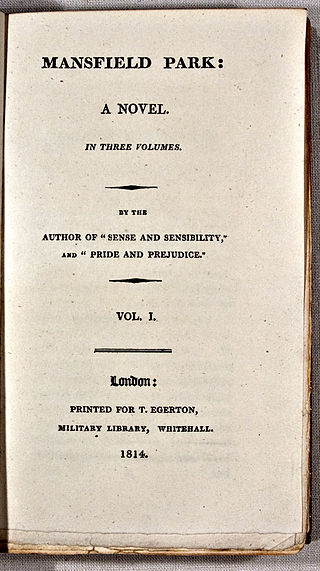
Mansfield Park is the third published novel by the English author Jane Austen, first published in 1814 by Thomas Egerton. A second edition was published in 1816 by John Murray, still within Austen's lifetime. The novel did not receive any public reviews until 1821.
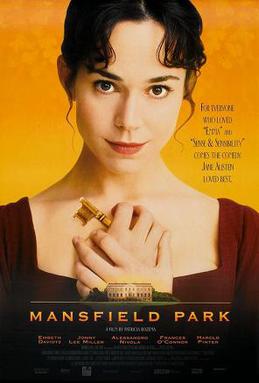
Mansfield Park is a 1999 British romantic comedy-drama film based on Jane Austen's 1814 novel of the same name, written and directed by Patricia Rozema. The film departs from the original novel in several respects. For example, the life of Jane Austen is incorporated into the film, as are the issues of slavery and West Indian plantations. The majority of the film was filmed on location at Kirby Hall in Northamptonshire.
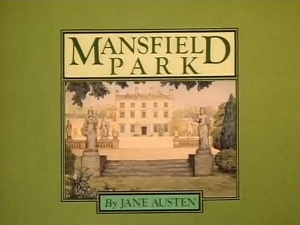
Mansfield Park is a 1983 British television drama serial, made by the BBC, and adapted from Jane Austen's 1814 novel of the same name. The serial was the first screen adaptation of the novel. Unlike Patricia Rozema's 1999 film, it is faithful to Jane Austen's novel. Jonny Lee Miller, who has a small role as Charles Price in this serial, played Edmund Bertram in Rozema's adaptation.

Mansfield Park is a 2007 British television film directed by Iain B. MacDonald and starring Billie Piper, Michelle Ryan, and Blake Ritson. Adapted from Jane Austen's classic 1814 novel of the same name, the film is about Fanny Price, who is sent by her poor mother to live with wealthy relatives at their Mansfield estate. By the age of eighteen, Fanny is in love with her sensitive cousin who is studying to be a clergyman. Her feelings for him and her moral sense prevent her from accepting a marriage proposal from a much wealthier suitor.

The reception history of Jane Austen follows a path from modest fame to wild popularity. Jane Austen (1775–1817), the author of such works as Pride and Prejudice (1813) and Emma (1815), has become one of the best-known and most widely read novelists in the English language. Her novels are the subject of intense scholarly study and the centre of a diverse fan culture.

Frances "Fanny" Price is the heroine in Jane Austen's 1814 novel, Mansfield Park. The novel begins when Fanny's overburdened, impoverished family—where she is both the second-born and the eldest daughter out of 10 children—sends her at the age of ten to live in the household of her wealthy uncle, Sir Thomas Bertram, and his family at Mansfield Park. The novel follows her growth and development, concluding in early adulthood.

Henry Crawford is one of the main characters in Jane Austen's 1814 novel, Mansfield Park. He is depicted as a man who, though not conventionally handsome, has great charisma. He is lively, witty and charming, a great asset at dinner parties, and admired by nearly all. Henry and his sister bring a fresh energy to the rather dour and oppressive atmosphere of Mansfield Park. At Sotherton his potential for disruption begins to emerge.

Edmund Bertram is a lead character in Jane Austen's 1814 novel Mansfield Park. He is Sir Thomas's second son and plans to be ordained as a clergyman. He falls in love with Mary Crawford who constantly challenges his vocation. Edmund goes ahead with ordination. At the end of the novel he marries Fanny Price.

Maria Bertram is a fictional character in Jane Austen's 1814 novel, Mansfield Park.
Tom Bertram is a supporting character in Jane Austen's 1814 novel, Mansfield Park. He is the elder son and heir of Sir Thomas Bertram, a baronet and wealthy landowner in Northamptonshire, who also owns an estate in Antigua.

Mary Crawford is a major character in Jane Austen's 1814 novel, Mansfield Park. Mary is depicted as attractive, caring and charismatic. The reader is gradually shown, often through the eyes of Fanny Price, a hidden, darker side to Mary's personality. Her wit disguises her superficiality and her charisma disguises her self-centredness. Edmund Bertram, an earnest young man and destined for the clergy falls deeply in love with her. Only at the end of the novel does reality overcome his romantic fantasies and he leaves her with deep regret.
Jane Austen's (1775–1817) distinctive literary style relies on a combination of parody, burlesque, irony, free indirect speech and a degree of realism. She uses parody and burlesque for comic effect and to critique the portrayal of women in 18th-century sentimental and Gothic novels. Austen extends her critique by highlighting social hypocrisy through irony; she often creates an ironic tone through free indirect speech in which the thoughts and words of the characters mix with the voice of the narrator. The degree to which critics believe Austen's characters have psychological depth informs their views regarding her realism. While some scholars argue that Austen falls into a tradition of realism because of her finely executed portrayal of individual characters and her emphasis on "the everyday", others contend that her characters lack a depth of feeling compared with earlier works, and that this, combined with Austen's polemical tone, places her outside the realist tradition.

Georgian society in Jane Austen's novels is the ever-present background of her work, the world in which all her characters are set. Entirely situated during the reign of George III, the novels of Jane Austen describe their characters' everyday lives, joys, sorrows, and loves, providing insight into the period.
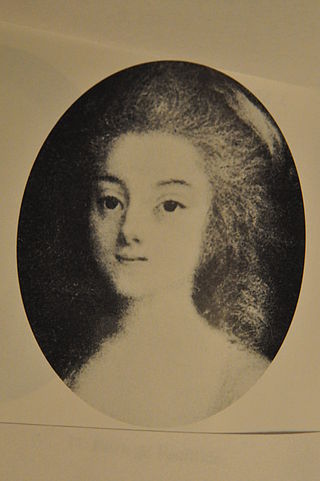
Eliza Capot, Comtesse de Feuillide was the cousin, and later sister-in-law, of novelist Jane Austen. She is believed to have been the inspiration for a number of Austen's works, such as Love and Freindship, Henry and Eliza, and Lady Susan. She may have also been the model from whom the character of Mary Crawford is derived.
Mansfield Park is a 2011 chamber opera in two acts by Jonathan Dove with a libretto by Alasdair Middleton based on the 1814 novel by Jane Austen. Initially composed for four handed piano, it has been set to music for 13 piece orchestral ensemble. It tells the story of poor relation Fanny Price, sent at age 10 to live with her uncle, Sir Thomas Bertram, at his family estate, Mansfield Park.

Mr William Collins is a fictional character in the 1813 novel Pride and Prejudice by Jane Austen. He is the distant cousin of Mr Bennet, a clergyman and holder of a valuable living at the Hunsford parsonage near Rosings Park, the estate of his patroness Lady Catherine De Bourgh, in Kent. Since Mr and Mrs Bennet have no sons, Mr Collins is also the current heir presumptive to the Bennet family estate of Longbourn in Meryton, Hertfordshire, due to the estate being entailed to heirs male. Mr Collins is first introduced during his visit to Longbourn. His dull-witted character is in parallel to another 'Austen' character, Mr. Rushworth, from Mansfield Park. Mr Collins is also somewhat comparable to the Shakespearean character, Malvolio, from Twelfth Night.
Old Friends and New Fancies: An Imaginary Sequel to the Novels of Jane Austen (1913) is a novel by Sybil G. Brinton that is often acknowledged to be the first sequel to the works of Jane Austen and as such is possibly the first piece of published Austen fan fiction, although earlier examples have been described by Sarah Glosson. It incorporates characters from each of Austen's six major novels into one unified story, alongside characters of Brinton's own invention. Keeping to the spirit of the source novels, its major theme is the difficulties faced by assorted pairs of lovers placed within the class structure of early 19th century Britain.
